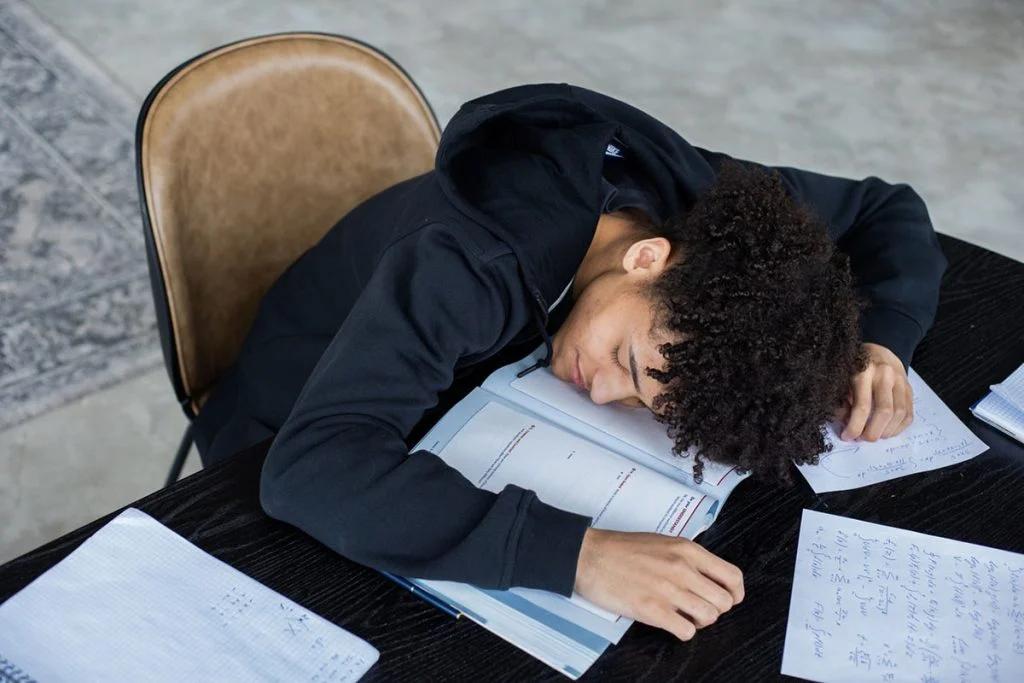
Telehealth: A Cost-Effective Solution for Students
June 10, 2022
Therapy for College Students and its Importance
July 19, 2022College life is filled with new experiences, good and bad. Tiredness comes with the territory, and in most cases, that’s fine. The trouble comes when you can’t shake that tiredness, and other symptoms start to arise.
Burnout is a real problem in modern life, and it comes from the progression of simple fatigue into a more chronic condition that can bring serious health issues.
Fortunately, there are some simple solutions and easy warning signs to look out for.
Tired Student or Burnout?
Tiredness is a normal part of college life. A lot is going on, both on and off-campus, and the stimulation, coupled with the sudden lack of structure can create a perfect recipe for excess.
There are correlations between burnout, perfectionism, and perceived stress, so if you’re the kind of person who wants to do everything perfectly you’re more likely to feel stressed to achieve, and in that case, it might be worth looking into whether you’re experiencing the burnout from college.
But what does burnout look like? One of the reasons it’s so hard to identify is that it takes many forms, and usually, its manifestations are all too familiar symptoms of much less-serious issues such as simple tiredness or overstimulation.
That’s not to say that tiredness is entirely harmless; sleep deprivation alone can create problematic scenarios, especially when it comes to absorbing, storing, and making use of information – the keys to successful studying. However, take a look at some of the trouble signs we’ve listed below and see if the solutions that follow are available to you.
7 Things a Tired College Student Should look out for
The first thing that differentiates burnout from simple tiredness is that the latter is a chronic condition. Most of these symptoms occur the moment you pull an all-nighter, and conversely are fixable simply by paying back your sleep debt. If these symptoms appear to last a long time and are harder to fix, they may be a sign that you’re burnt out.
- Insomnia – This can come in many forms. You might be finding it hard to get to sleep, or you may be putting in the hours and not getting the quality you need. If this goes on for a long time, there is a cascade of other detrimental effects that come with it.
- Numbness – This is a state of being in which you feel emotionally restricted. It’s a very subtle and insidious symptom of burnout and is common in coincidence with depression, or as a response to trauma.
- Brain Fog – This is often associated with emotional numbness, and comes as a thick haze that seems to surround your thoughts throughout the day. This makes it hard to stay alert and focused and will greatly diminish your ability to study.
- Low motivation – Another of the emotional symptoms of burnout is problems with ‘executive function’. This means that despite you knowing that you’ve got to get on with something – and actually really wanting to do it – you just can’t find the motivation to get it done.
- Addictive or excessive behaviors – One behavioral symptom of burnout can be the over-indulgence in various pleasurable activities. This can be food, drugs, sex, or alcohol; and it can manifest in other bad habits such as biting nails.
- Loneliness – This may be more of a precursor than a symptom, but it’s important to add to the list. There is a correlation between loneliness and the risk of burnout, so if this is something you feel often, it could be a warning sign.
- Physical pain – Especially if you’re working out, you may feel that recovery is taking longer. Even if you’re not, you might experience aches in your back or increased headaches.
As mentioned, these symptoms often show up at the early stages of fatigue, and any tired college student may expect to meet them at one time or another. Serious issues arise when these conditions become commonplace, and continued experiences lead to damaging health conditions. Luckily, there are some cheap and effective ways to mitigate this.

Solutions to Burnout
As we’ve seen, burnout can cause sleep problems. However, the reverse is also true. If you’re not getting enough rest between wakeful periods, your risk of burning out is significantly increased. Common factors that affect the quality and duration of sleep in tired students are:
- Alcohol consumption – alcohol can affect both the quality and length of sleep and can affect sleep for many days afterward. Binge-drinking even once a week, but certainly multiple times, doesn’t give your brain time to recover and can create a chronic sleeping issue.
- Stress – this is an obvious one, and very hard to avoid at college. Stress to some degree is inevitable, but when it becomes insurmountable it can ruin your chances of falling asleep or staying asleep.
- Staying up late – Another common effect of college life is the ‘extracurricular’ experiences, which often lead late into the night; followed by a 9 am lecture. This is a simple behavioral cause of bad sleep.
- Caffeinated drinks – an obvious and yet surprisingly common cause of sleepless nights is the copious amounts of coffee you’ve used to stay awake in the morning, followed by the energy drinks or caffeinated sodas throughout the day.
- Staying in new locations – There’s typically an adjustment that has to occur when you move to a new place. Quality of sleep drops for a little while until your subconscious mind assesses the location to be safe. If you’ve recently arrived at a new location, there’s a chance your tiredness is related to this.
Alleviating the effect of burnout could be as simple as pulling back on any of these factors. Of course, reducing stress is easier said than done, but there are some effective ways to mitigate the effect of stress on your life too:
- Meditation
- Exercise
- Diet
- Sleep
So, now we are starting to see some overlap in the causes and effects of burnout. Sleep is disturbed when you’re burnt out, and stress compounds that. But sleeping can improve stress, which creates a knock-on effect that reduces burnout.
Still, in order to sleep, you need to reduce stress, and you can’t do that because you can’t sleep! It might all begin to feel a bit hopeless, but there is some method to the madness.
Everyone’s experience will differ, and some people will need to tackle one symptom before they can move on to another. If you’re worried about burnout, focus on the solution to whichever symptom is most accessible to you, and with a bit of care, the others should fall into place around that.
It’s harder to combat loneliness. Sometimes it’s important to put yourself into social situations, even when you don’t feel very sociable. For some, this will allow you to recharge, for others, it’s the opposite. It’s up to you to figure out how to balance your social life against your feelings of loneliness, and a trained professional might be better at helping you through this.
It’s important to see a counselor or health professional if you’re still experiencing these symptoms after trying to work with them. Check out a Telehealth app for a place to browse doctors and book an appointment.
Conclusion
Burnout affects millions of people worldwide, and it comes from an ever-increasing culture of working non-stop. When work takes up your entire life, it’s common to skip sleep to squeeze in everything else that makes life fun.
Look out for these warning signs of burnout and be honest with yourself about how long they’ve been present. The first step to solving it is to correctly identify it and spot the areas in which you need to pull back and take care of yourself.
Adopting any of the healthy practices that mitigate the issue is the next step, and for most, this will be enough to get your mind and body back on track. However, if you’re still struggling, it’s important to contact a professional for help.
If you are a college / university administrator or student, please contact us to learn more about StudentBody.care, the Telehealth service designed specifically for colleges and universities.




